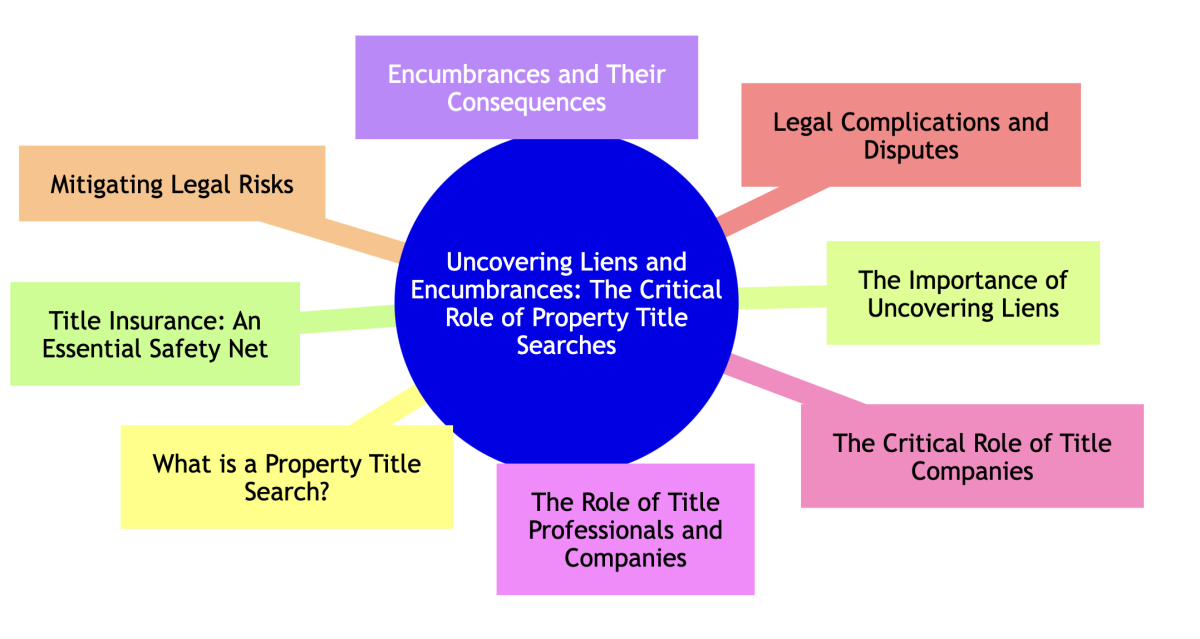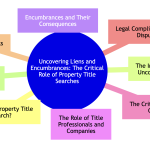When venturing into real estate, the significance of a thorough property title search cannot be overstated. This critical process goes beyond mere formality; it's a crucial step in safeguarding your investment and ensuring the legitimacy of your property ownership. Understanding the intricacies of title searches, particularly in uncovering liens and encumbrances, is essential for any prospective property buyer or lender. The risks associated with overlooking these aspects can lead to significant financial and legal repercussions, making the role of title searches in real estate transactions indispensable. Generally, the quickest, safest bet is to google your location followed by"property search". For example, a homebuyer in Maryland should Google "Maryland property search" or "Maryland title search" and look for good reviews.
Key Takeaways
- Understanding Title Searches: A title search is a detailed investigation of public records to determine the legal ownership of a property and reveal any liens or encumbrances.
- Uncovering Liens: Identifying any outstanding debts or claims on the property is crucial, as these can become the buyer's responsibility if not addressed.
- Encumbrances and Risks: Title searches also reveal encumbrances, such as easements or restrictions, that could affect property usage and value.
- Professional Expertise: Conducted by experienced professionals, title searches ensure a comprehensive evaluation of the property’s title history.
- Preventing Legal Disputes: A thorough title search can prevent future legal issues regarding ownership and claims on the property.
What is a Property Title Search?
A property title search is an investigative process that delves into public records to establish a property's ownership and legal standing. This process is critical in ensuring that no existing claims, liens, or other encumbrances might adversely affect the property's title.
Why is it Necessary?
- Legal Ownership Verification: It confirms the property's rightful owner, preventing disputes and legal complications.
- Unearthing Liens and Encumbrances: It identifies any obligations or restrictions tied to the property, safeguarding the buyer’s interests.
- Ensuring Transaction Transparency: It provides a clear picture of the property’s history, ensuring informed decision-making.
The Process
- Examination of Public Records: Title professionals scrutinize public records, including deeds, court records, and property and name indexes.
- History Tracing: They trace the property's ownership history, ensuring there are no gaps or discrepancies.
- Identification of Issues: Any irregularities, such as unpaid taxes or unsatisfied mortgages, are flagged for resolution.

The Importance of Uncovering Liens
Uncovering liens is a fundamental aspect of the title search process. Liens represent financial obligations tied to the property, often stemming from unpaid debts or legal judgments. The new owner may unwittingly inherit these debts if these are not identified and resolved before a property's purchase.
Types of Liens
- Mortgage Liens: Linked to unpaid mortgages.
- Tax Liens: Due to unpaid property taxes.
- Judgment Liens: Arising from legal judgments against the property owner.
Consequences of Overlooking Liens
- Financial Liability: New owners might become responsible for settling these debts.
- Legal Challenges: Unresolved liens can lead to legal disputes and complications in property ownership.
Encumbrances and Their Consequences
Understanding Encumbrances in Property
Encumbrances refer to legal restrictions or rights that are attached to a property, which can stay in effect even after the property changes hands. Unlike liens, which are primarily financial claims, encumbrances can include a variety of limitations or rights that impact the property.
Types of Common Encumbrances
- Easements: These are rights granted to individuals or entities, separate from the property owner, to use a portion of the property for a specific purpose. Examples include utility companies having the right to lay cables or pipelines, or a neighbor having a right of way across the land. Easements can limit the owner's ability to alter certain parts of their property, impacting future development plans.
- Covenants: Often found in planned communities or developments, covenants are rules or guidelines set by homeowners' associations (HOAs) or past property owners. These can dictate everything from the color one can paint a house to the types of landscaping allowed. Covenants are designed to maintain a certain aesthetic or standard within a community but can be restrictive for property owners looking to personalize their space.
Impact on Property Value and Usage
- Limitations on Property Usage: Certain encumbrances can impose significant limitations on how a property is used. For instance, an easement for a public walkway can restrict the owner from building in that area, potentially affecting expansion plans or privacy.
- Influence on Property Appeal and Value: Encumbrances can affect a property's appeal to potential buyers, especially if they impose notable restrictions. This can, in turn, impact the property's market value, as buyers might be less inclined to purchase a property with significant limitations.
- Potential for Legal Disputes: Encumbrances can be sources of conflict, especially if they are not clearly understood or if there is a disagreement over their interpretation. Disputes over easements, for example, can result in legal challenges, requiring intervention and resolution through legal means.
Understanding the types and implications of encumbrances is vital in property transactions. They play a significant role in determining a property's desirability, usability, and value. As such, uncovering and comprehensively understanding these encumbrances during a title search is critical for any prospective buyer or investor in real estate.
Encumbrance Identification Table
|
Encumbrance Type |
Description |
Potential Impact |
|
Easements |
Rights to use the property for specific purposes |
Can limit property development and usage |
|
Covenants |
Restrictions imposed by associations or past owners |
Can affect property modifications and usage |
|
Liens |
Financial claims due to debts or obligations |
Financial liability for new owners |
The Role of Title Professionals and Companies
Successful property title searches require a level of expertise and diligence that is typically beyond the purview of the average property buyer. This is where title professionals and companies step in, offering their specialized skills to ensure a thorough and accurate title search.
The Expertise of Title Professionals
Title professionals are essential in conducting property title searches, bringing their deep understanding of legal and real estate terms and knowledge of property ownership laws at both local and federal levels. Their expertise is crucial in meticulously examining a property's legal history, ensuring thoroughness and accuracy. This expertise becomes particularly valuable when dealing with diverse property types and varying complexities in transactions, providing an added layer of assurance to both buyers and lenders.
The Critical Role of Title Companies
Title companies also play a vital role in this process. They conduct detailed searches of public records to identify any issues that might impact the property's title. This thorough examination is key to detecting all claims, liens, and encumbrances that could affect ownership. Beyond just identifying these issues, title companies are central to resolving them. They address outstanding liens or legal complexities, ensuring that these matters are settled before the transfer of property ownership. This proactive approach by title companies is fundamental in protecting the interests of everyone involved in the property transaction.
Legal Complications and Disputes
A title search is more than a mere formality; it protects against potential legal complications arising from undiscovered claims or disputes over property ownership.
Preventing Ownership Disputes
- Ownership Verification: By verifying the legal owner of the property, title searches prevent disputes that might arise from claims by previous owners or heirs.
- Addressing Historical Issues: They also help address any historical issues that could resurface and challenge the current ownership.
Mitigating Legal Risks
- Identifying Legal Claims: Title searches identify any legal claims against the property, such as liens from creditors or legal judgments.
- Safeguarding Against Future Disputes: By ensuring that these claims are resolved, title searches reduce the risk of future legal disputes and financial liabilities for the new owner.
Title Insurance: An Essential Safety Net
While a title search significantly reduces the risks involved in property transactions, it is not infallible. This is where title insurance comes into play, providing an essential safety net for property buyers.
Purpose of Title Insurance
- Protection Against Unforeseen Issues: Title insurance protects buyers from any issues that might have been missed during the title search process.
- Coverage for Future Claims: It covers the cost of legal defense if any claims against the property arise after the purchase.
Types of Title Insurance
- Owner’s Policy: Protects the property buyer from future claims and legal fees.
- Lender’s Policy: Required by lenders to protect their investment in the property.
Benefits of Title Insurance
- Peace of Mind: It offers buyers peace of mind, knowing they are protected against potential title issues.
- Financial Protection: Title insurance can save buyers from significant financial losses due to title-related problems.

Final Thoughts
Conducting a property title search is indispensable to any real estate transaction. This meticulous procedure goes beyond simply establishing ownership; it uncovers liens and encumbrances that could have significant legal and financial implications for the property buyer. Understanding the complexities of liens, encumbrances, and the roles of title professionals and companies is crucial for anyone involved in property transactions.
A comprehensive title search ensures that potential property owners know any legal claims, financial obligations, or usage restrictions tied to the property. This protects them from unexpected liabilities and ensures that their investment is secure. The importance of this process cannot be overstated.
For those seeking a reliable partner in navigating the complexities of property title searches, Title Search Direct offers expert services that ensure thoroughness and accuracy.
With their deep understanding of the legalities and nuances of property titles and commitment to providing detailed and transparent results, Title Search Direct stands as a trusted resource in the real estate industry. Whether you are a buyer, a real estate professional, or a lender, partnering with Title Search Direct can provide the assurance and expertise necessary to ensure that your real estate transactions are secure and free from unforeseen complications.










